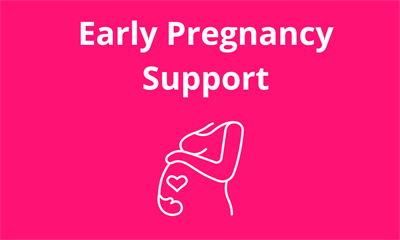
Congratulations on your pregnancy. Here is some practical advice for you during the first few weeks of your pregnancy.
Having a baby is one of the most exciting things that can happen to you. But you might be feeling nervous as well. If it’s your first baby, it’s hard to know what to expect. Your mum, colleagues, friends and relations might all be giving you advice. And then there is all the information on the internet as well as in magazines and books. At times it can feel overwhelming and it’s hard to know who is right when people say different things. Advice on our website including our many patients leaflets brings together everything you need to know to have a healthy and happy pregnancy, and to make sure you get the care that is right for you.
The guidance about pregnancy and babies does change, so it’s important to get up-to-date, trusted advice to help you make the right decisions and choices. If you have any questions or concerns – no matter how trivial they may seem – just ask and talk to your midwife or doctor. They are there to support you.
See a GP or midwife as soon as you find out you're pregnant. It's important to see a midwife or GP as early as possible to get the pregnancy (antenatal) care and information you need to have a healthy pregnancy. You can self Refer to George Eliot Hospital via our Badgernet e referral system here.
If you're not yet registered with a GP, use the service search to find a GP near you. You can also find out about local maternity services.
Your pregnancy can be treated confidentially, even if you are under 16. A GP or midwife can tell you about your choices for pregnancy (antenatal) care in your local area. Being pregnant may affect the treatment of any current illness or conditions you have or later develop.
Read about the signs and symptoms of pregnancy and doing a pregnancy test.
Local Neonatal and Maternity System partnership - The pregnancy book
Partners
Partners may also have mixed feelings when they find out you are pregnant. They may find it hard to talk about their feelings because they do not want to upset you. Both of you should encourage each other to talk about your feelings and any worries or concerns..
Telling people that you're pregnant
You may want to tell your family and friends immediately, or wait a while until you know how you feel. Or you may want to wait until you have had your first ultrasound scan, when you're around 12 weeks pregnant, before you tell people.
Some of your family or friends may have mixed feelings or react in unexpected ways to your news. You may wish to discuss this with a midwife.
Read about dealing with feelings and relationships in pregnancy.
George Eliot Maternity is an NHS service providing a single point of access for all maternity referrals in the North Warwickshire area. The aim is to make sure you have access to the right care from day one. George Eliot Maternity will triage your referral based on the information you provide and the hospital will contact you to start your antenatal care. In the meantime if you are worried about your pregnancy, please tell your GP straight away.
Self referral to George Eliot Hospital
Click here to inform the NHS of your pregnancy. It's quick and easy and just takes a couple of minutes.
"Our Vision is to EXCEL at patient care"
Our values:
Effective open communication
EXcellence and safety in everything we do
Challenge but support
Expect respect and dignity
Local healthcare that inspires confidence
This department is open Monday to Friday from 8.30am-1pm, please note that after 1pm the EPAU phone automatically diverts to maternity reception. The Early Pregnancy Assessment Unit is for anyone having problems such as bleeding before 16 weeks pregnancy.
The Early Pregnancy Assessment Unit has now moved to Outpatients C in the Main Hospital from 1st floor maternity.
The phone number is 02476 86 5570.
Here are just a few of the things you could think about during your pregnancy to support your own health and wellbeing.
Have a healthy diet in pregnancy
Vegetarian or vegan and pregnant
Foods to avoid in pregnancy
Vitamins, supplements and nutrition in pregnancy
Exercise in pregnancy
Medicines in pregnancy
Mental health in pregnancy
Depression in pregnancy
Sex in pregnancy
Travelling in pregnancy
Work and pregnancy
Your baby's movements
Reducing the risk of stillbirth
Drinking alcohol while pregnant
Stop Smoking in Pregnancy
Illegal drugs in pregnancy
The flu jab in pregnancy
Whooping cough vaccination in pregnancy
Infections in pregnancy that may affect your baby
Vaccinations in pregnancy
Did you know you can have your COVID-19 vaccination at George Eliot Hospital. Ask your midwife.
Our drop in sessions are held in Coombe House (opposite the main hospital entrance - single story building - Five minute walk from the maternity building). Map of our Site
When should you call the hospital?
Visit the Feeling Unwell during your Pregnancy page for advice
Don't panic. Light vaginal bleeding is relatively common during the first trimester (first 3 months) of pregnancy and does not necessarily mean you're having a miscarriage. However, our advice below will hopefully help you should you need this.
What to do if you think you are bleeding or think you may be having /or had a miscarriage
If you have vaginal bleeding, contact a GP or your midwife or call our Early Pregnancy Assessment Unit on 02476 86 5570. Most GPs can refer you to an early pregnancy unit at your local hospital straight away if necessary.
A miscarriage is the loss of a pregnancy during the first 23 weeks.
You may be referred to a maternity ward if your pregnancy is at a later stage.
Symptoms of a miscarriage
The main sign of a miscarriage is vaginal bleeding, which may be followed by cramping and pain in your lower abdomen.
Causes of a miscarriage
There are potentially many reasons why a miscarriage may happen, although the cause is not usually identified.
The majority are not caused by anything you have done.
It's thought most miscarriages are caused by abnormal chromosomes in the baby. Chromosomes are genetic "building blocks" that guide the development of a baby. If a baby has too many or not enough chromosomes, it will not develop properly.
In most cases, a miscarriage is a one-off event and most people go on to have a successful pregnancy in the future.
Preventing a miscarriage
The majority of miscarriages cannot be prevented.
But there are some things you can do to reduce the risk of a miscarriage.
Avoid smoking, drinking alcohol and using drugs while pregnant.
Being a healthy weight before getting pregnant, eating a healthy diet and reducing your risk of infection can also help.
What happens if you think you're having a miscarriage
If you have the symptoms of a miscarriage, you'll usually be referred to a hospital for tests. In most cases, an ultrasound scan can determine if you're having a miscarriage.
When a miscarriage is confirmed, you'll need to talk to your doctor or midwife about the options for the management of the end of the pregnancy. Often the pregnancy tissue will pass out naturally in 1 or 2 weeks.
Sometimes medicine to assist the passage of the tissue may be recommended, or you can choose to have minor surgery to remove it if you do not want to wait.
After a miscarriage
A miscarriage can be an emotionally and physically draining experience.
You may have feelings of guilt, shock and anger.
Advice and support are available at this time from hospital counselling services and charity groups.
You may also find it beneficial to have a memorial for the baby you lost.
You can try for another baby as soon as your symptoms have settled and you're emotionally and physically ready.
It's important to remember that most miscarriages are a one-off and are followed by a healthy pregnancy.
How common are miscarriages?
Miscarriages are much more common than most people realise.
Among people who know they're pregnant, it's estimated about 1 in 8 pregnancies will end in miscarriage.
Many more miscarriages happen before a person is even aware they're pregnant.
Losing 3 or more pregnancies in a row (recurrent miscarriages) is uncommon and only affects around 1 in 100 women.
Support
Bereavement Support including support across Coventry and Warwickshire
NHS advice on miscarriage
Miscarriage Association
Our website contains lots of information. If there is anything you would like to see added to our website, please email communications
Patient Leaflets
Maternity Leaflets
The Pregnancy Book
Websites
NHS advice on miscarriage
Miscarriage Association
